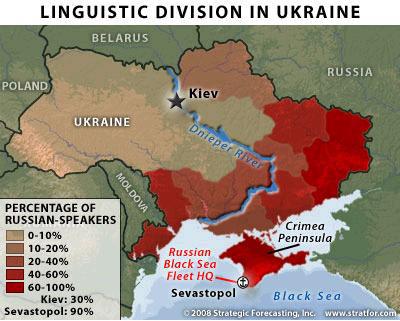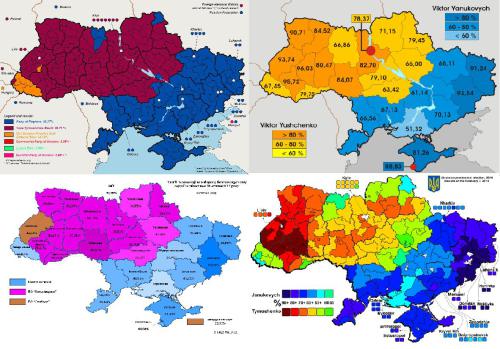Ukraine is in the news and that’s not a good thing.
I’m not a foreign policy expert, to be sure, but it can’t be a positive sign when nations with nuclear weapons start squabbling with each other. And that’s what’s happening now that Russia is supposedly occupying Crimea and perhaps other parts of Ukraine and Western powers are complaining.
I’m going to add my two cents to this issue, but I’m going to approach it from an unusual angle.
Look at this linguistic map of Ukraine. The red parts of the country show where Russian is the primary language and most people presumably are ethnically Russian.

Now look at these maps (from here, here, here, and here) showing various election results in the country.

Like I said, I’m not overly literate on foreign policy, but isn’t it obvious that the Ukrainians and the Russians have fundamentally different preferences?
No wonder there’s conflict.
But is there a solution? And one that doesn’t involve Putin annexing – either de facto or de jure – the southern and eastern portions of the nation?
It seems there are two options.
1. Secession – The first possibility is to let the two parts of Ukraine have an amicable (or at least non-violent) divorce. That’s what happened to the former Soviet Union. It’s what happened with Czechoslovakia became Slovakia and the Czech Republic. And it’s what happened (albeit with lots of violence) when Yugoslavia broke up.
For what it’s worth, I’ve already suggested that Belgium should split into two nations because of linguistic and cultural differences. So why not the same in Ukraine?
Heck, Walter Williams has argued that the same thing should happen in America, with the pro-liberty parts of the nation seceding from the statist regions.
2. Decentralization – The second possibility is for Ukraine to copy theSwiss model of radical decentralization. In Switzerland, even though there are French cantons, German cantons, and an Italian canton, the various regions of the country don’t squabble with each other because the central government is relatively powerless.
This approach obviously is more attractive than secession for folks who think that existing national borders should be sacrosanct.
And since this post is motivated by the turmoil in Ukraine, it’s worth pointing out that this also seems to be a logical way of defusing tensions across regions.
I confess I have a policy reason for supporting weaker national governments. Simply stated, there’s very strong evidence that decentralization means moretax competition, and when governments are forced to compete for jobs and investment, the economy is less likely to be burdened with high tax rates and excessive redistribution.
Indeed, we also have very strong evidence that the western world became prosperous precisely because the proliferation of small nations and principalities restrained the natural tendencies of governments to oppress and restrain economic activity.
And since Ukraine (notwithstanding it’sflat tax) has a very statist economic system – ranking only 126th in theEconomic Freedom of the World index, maybe a bit of internal competition would trigger some much-needed liberalization.
